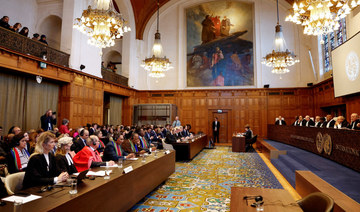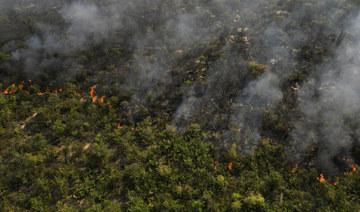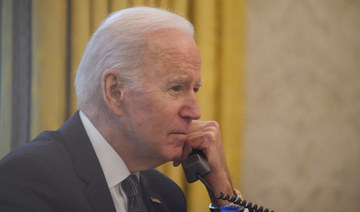JALALABAD, Afghanistan: A suicide bomb blast in Afghanistan’s eastern city of Jalalabad killed 33 people and injured more than 100 on Saturday outside a bank where government workers collect salaries, the city’s police chief said.
Police were investigating whether there was a second explosion after people rushed to the scene to help, the police chief, Fazel Ahmad Sherzad, told a news conference.
“It was a suicide attack,” Sherzad said, adding police had yet to determine if the attacker had worn the explosives or had placed them in a car. “It is early to say what kind of suicide bomber.”
Taleban insurgents denied responsibility. The militants, who were ousted from power by a US-led invasion in 2001, rarely claim attacks that kill large groups of civilians, saying their activities are restricted to foreign or Afghan military and government targets.
“It was an evil act. We strongly condemn it,” the Islamist militants’ spokesman, Zabihullah Mujahid, told Reuters.
Police said another blast that shook Jalalabad was a controlled detonation after experts discovered a further bomb close to the scene of the first explosion.
Local media reported a former spokesman for the Pakistani Taleban claimed responsibility for bombings in the eastern city on behalf of the Islamic State in both Pakistan and Afghanistan.
The spokesman could not be reached and his connection to the group could not be verified by Reuters.
Elsewhere in the east, the Taleban announced the execution of three men accused of murdering a couple during a robbery, saying they had been tried by an Islamic court.
The killing was carried out in front of a crowd by Taleban fighters who fired at the men with AK-47s, according to a Reuters witness. Footage seen by Reuters show the men were made to sit on the ground with their eyes blindfolded and their hands tied at the time of their execution.
“(They) killed a female doctor and her husband ... inside their house and then they took all their assets, jewelry and cash,” the Taleban said in a statement.
The executioners, one stood behind each man, also had their faces covered, and were dressed in white salwar kameez and turbans. After the initial shots were fired, one continued to shoot at the bodies while the crowd of villagers cheered.
This is the first year Afghan forces are facing the Taleban with very limited international support on the ground, although help with intelligence and special operations will continue through 2016.
On Saturday, parliament approved the nomination of 16 ministers, leaving only the position of defense minister vacant because the president and his coalition have been unable to agree on a candidate.
The vacancy has frustrated military officials who say the army has been left rudderless in the face of escalating violence by the Taleban.
NATO, which at its peak had 130,000 soldiers in Afghanistan, has only a small contingent of around 12,000 troops left and most are involved in training.
Afghanistan suicide blast kills 33, targets government workers
Afghanistan suicide blast kills 33, targets government workers
Top UN court to rule in Germany ‘genocide’ case over Gaza
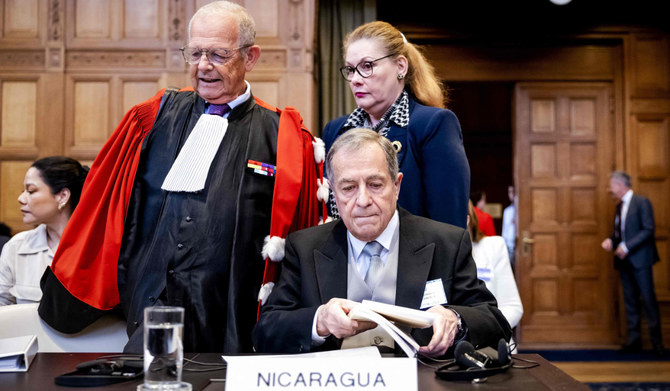
- Israel has killed at least 34,488 people in Gaza, mostly women and children, according to the Hamas-run territory’s health ministry
- Press reports have identified a battalion called the Netzah Yehuda, composed mainly of ultra-Orthodox Jews, as being accused of abuses. It is about 1,000-strong and since 2022 has been stationed in the West Bank, which Israel has occupied since 1967
THE HAGUE: The United Nations’ top court will on Tuesday rule on charges by Nicaragua that Germany is breaching the 1948 Genocide Convention by supplying arms to Israel for the Gaza war.
Nicaragua has hauled Germany before the International Court of Justice (ICJ) to demand that judges impose emergency measures to stop Berlin from providing Israel with weapons and other assistance.
More than 34,000 people have been killed in the Palestinian territory since war broke out in October following a cross-border attack by Hamas that left around 1,170 Israelis dead.
The ICJ in The Hague is scheduled to issue an order at 3:00 p.m. (1300 GMT).
Nicaragua targeted Germany rather than Israel’s main ally, the United States, because Washington did not recognize the ICJ’s jurisdiction in the case, Managua’s lawyers have said.
They say Israel is in breach of the 1948 Genocide Convention.
Top lawyers from the two countries clashed earlier this month at the court, with Nicaragua saying Germany was “pathetic” to be both providing weapons to Israel and aid to Gazans.
Berlin retorted that Israel’s security was at the “core” of its foreign policy and argued that Nicaragua had “grossly distorted” Germany’s supply of military aid to Israel.
“Germany only supplies arms based on a meticulous scrutiny that far exceeds the demands of international law,” said Tania von Uslar-Gleichen, a German representative to the ICJ.
Those supplies are “subject to a continuous evaluation of the situation on the ground,” she added.
“The moment we look closely, Nicaragua’s accusations fall apart,” Christian Tams, another representative for Germany, told the court.
Nicaragua requested five emergency measures, including that Germany “immediately suspend its aid to Israel, in particular its military assistance including military equipment.”
The war began with an unprecedented Hamas attack that resulted in the deaths of about 1,170 people in Israel, according to an AFP tally of Israeli official figures.
Israel vowed to destroy Hamas, with a retaliatory offensive that has killed at least 34,488 people in Gaza, mostly women and children, according to the Hamas-run territory’s health ministry.
Cases relating to the Gaza war brought before the ICJ are closely followed.
In another procedure, South Africa has accused Israel — which like the US is not a member of the court — of perpetuating genocide in the Gaza Strip.
Israel “categorically” denies the South African accusations, which include responsibility for starvation.
In that case, the court called on Israel to do everything in its power to prevent genocide and recently ordered the country to “ensure urgent humanitarian assistance” in Gaza without delay.
Even though ICJ decisions are binding, the court has no mechanism to enforce them.
For example, it ordered Russia to cease its invasion of Ukraine, in vain.
Philippine students are told to stay home as Southeast Asia swelters in prolonged heat wave
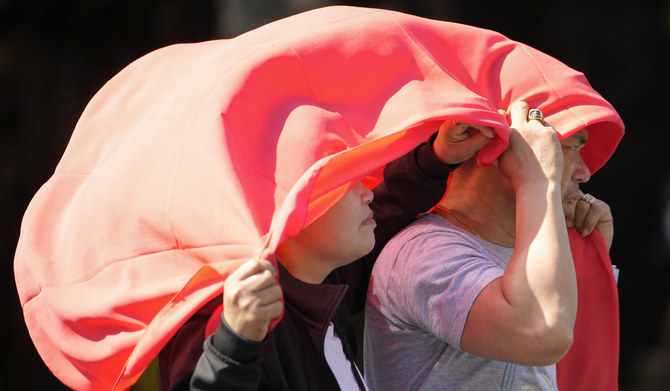
- The Philippines is among the nations worst affected by the sweltering weather in Southeast Asia, where the intense tropical summer heat worsened by humidity forced class cancelations in recent weeks and sparked fears of water shortages, power outages
MANILA, Philippines: Southeast Asia was coping with a weekslong heat wave on Monday as record-high temperatures led to school closings in several countries and urgent health warnings throughout the region.
Millions of students in all public schools across the Philippines were ordered to stay home Monday after authorities canceled in-person classes for two days. The main advice for everyone, everywhere has been to avoid outdoor activities and drink plenty of water, but the young and the elderly were told to be especially careful.
Cambodia this year is facing the highest temperatures in 170 years, Chan Yutha, a spokesperson for the Ministry of Water Resources and Meteorology, told The Associated Press on Monday. His agency has forecast that temperatures in most parts of the country could reach up to 43 degrees Celsius (109 degrees Fahrenheit) this week.
Myanmar’s meteorological department said Monday that seven townships in the central Magway, Mandalay, Sagaing and Bago regions experienced record-high temperatures. Several towns in Myanmar last week were on lists of the hottest spots worldwide.
Chauk township in Magway, historically the country’s hottest region, saw Myanmar’s highest temperature at 48.2 degrees Celsius (118.8 degrees Fahrenheit), breaking the previous record of 47.4 degrees Celsius (117.3 degrees Fahrenheit) set in 1968.
The Philippines is among the nations worst affected by the sweltering weather in Southeast Asia, where the intense tropical summer heat worsened by humidity forced class cancelations in recent weeks and sparked fears of water shortages, power outages and damage to agricultural crops.
The Department of Education ordered students in more than 47,000 public schools to switch to home-based and online learning due to health risks from record-high temperatures and a three-day strike starting Monday by drivers who oppose a government program they fear would remove dilapidated passenger jeepneys from streets.
Large crowds have sought relief in air-conditioned shopping malls in Metropolitan Manila, the congested capital region of more than 14 million people where the temperature soared to 38.8 degrees Celsius (101.84 Fahrenheit) Saturday, surpassing the record set decades ago, according to weather officials.
In Thailand, temperatures have topped 44 C (111 F) in some areas in the northern parts of the country, while the capital Bangkok and metropolitan areas have seen temperatures go above 40 C (104 F). The forecast from the Meteorological Department said this year’s summer, which usually lasts from late February to late May, is expected to be 1-2 degrees hotter than last year, and rainfall will be lower than average.
Thailand’s Department of Disease Control said last week that at least 30 people have died from heatstroke so far this year, compared to 37 for all of last year.
Scientists have said the number of heat-related deaths around the world has been rising significantly in recent years along with temperatures, but the trend in Asia this year so far is unclear, partly because of the question of how to classify deaths that appear to be heat related.
At least 34 people have fallen ill due to the extreme heat in the Philippines so far this year, including six who died. The Department of Health said it was verifying what exactly caused the deaths.
Media in Bangladesh reported that in a five-day period earlier this month, at least 20 people died from heatstroke.
In Cambodia, however, officials indicated there were few if any heat-related fatalities. The Khmer Times, an online news platform, quoted the head of the Health Department of Phnom Penh, the capital, saying there had been no heat-related deaths or collapses.
Israel-Hamas war protesters and police clash on Texas campus, Columbia University begins suspensions
Israel-Hamas war protesters and police clash on Texas campus, Columbia University begins suspensions
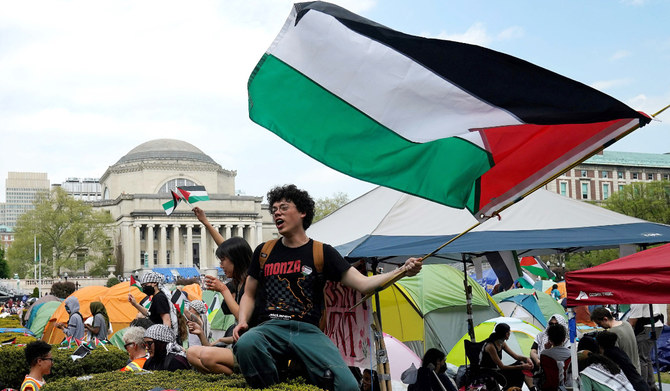
- At Columbia, student activists defied a 2 p.m. deadline to leave an encampment of around 120 tents on the school’s Manhattan campus
- Israel has killed more than 34,000 Palestinians in Gaza, mostly women and children, according to the health ministry in the Hamas-run territory
NEW YORK: Protesters and police clashed Monday at the University of Texas in a confrontation that resulted in dozens of arrests, and Columbia University began issuing suspensions as colleges around the US begged pro-Palestinian demonstrators to clear out tent encampments as commencement ceremonies approach.
From coast to coast, demonstrators are sparring over the Israel-Hamas war and its mounting death toll, and the number of arrests at campuses nationwide is approaching 1,000 as the final days of class wrap up. The outcry is forcing colleges to reckon with their financial ties to Israel, as well as their support for free speech.
The protests have even spread to Europe, with French police removing dozens of students from the Sorbonne university after pro-Palestinian protesters occupied the main courtyard. In Canada, student protest camps have popped up at the University of Ottawa, McGill University in Montreal and the University of British Columbia in Vancouver, The Canadian Press reported.
At the University of Texas at Austin, an attorney said at least 40 demonstrators had been arrested Monday, some of them by officers in riot gear who encircled about 100 sitting protesters, dragging or carrying them out one by one amid screams. Another group of demonstrators trapped police and a van full of arrestees between buildings, creating a mass of bodies pushing and shoving and prompting the officers to use pepper spray and flash-bang devices to clear the crowd.
The confrontation was an escalation on the 50,000-student campus in the state’s capital. On social media, Republican Gov. Greg Abbott reposted video of state troopers arriving, saying “No encampments will be allowed.” Just last week, hundreds of police pushed into protesters at the university, arresting more than 50 people.
The Texas protest and others grew out of Columbia’s early demonstrations that have continued. On Monday, student activists at Columbia defied a 2 p.m. deadline to leave an encampment of around 120 tents on the school’s Manhattan campus. Instead, hundreds of protesters marched around the quad, clapping, chanting and weaving around piles of temporary flooring and green carpeting meant for graduation ceremonies that are supposed to begin next week.
A handful of counter-demonstrators waved Israeli flags, and one held a sign reading, “Where are the anti-Hamas chants?”
The university didn’t call police to roust the demonstrators. But three hours after the deadline passed, school spokesperson Ben Chang said Columbia had begun suspending students. He didn’t indicate how many students were involved. He also didn’t say how the suspensions would be carried out or whether suspended students would be ejected from the campus.
Chang said that while the university appreciated the free speech rights of students, the encampment was a “noisy distraction” that was interfering with teaching and preparation for for final exams. The protests also made some Jewish students deeply uncomfortable, he said.
Protest organizers said they were not aware of any suspensions as of Monday evening.
The notice sent to protesters earlier Monday said if they left by the deadline and signed a form committing to abide by university policies through June 2025, they could finish the semester in good standing. If not, the letter said, they would be suspended, pending further investigation.
College classes are wrapping up for the semester, and campuses are preparing for graduation ceremonies, giving schools an extra incentive to clear encampments. The University of Southern California canceled its main graduation ceremony.
But students dug in their heels at other high-profile universities, with standoffs continuing at Harvard, the University of Pennsylvania, Yale and others.
Protesters at Yale set up a new camp with dozens of tents Sunday, nearly a week after police arrested nearly 50 and cleared a similar one nearby. They were notified by a Yale official that they could face discipline, including suspension, and possible arrest if they continued.
Yale said in a statement Monday that while it supports peaceful protests and freedom of speech, it does not tolerate policy violations such as the encampment. School officials said that the protest is near residential colleges where many students are studying for final exams, and that permission must be granted for groups to hold events and put up structures on campus.
In a rare case, Northwestern University said it reached an agreement with students and faculty who represent the majority of protesters on its campus near Chicago. It allows peaceful demonstrations through the June 1 end of spring classes, requires removal of all tents except one for aid, and restricts the demonstration area to allow only students, faculty and staff unless the university approves otherwise.
At Brown University in Rhode Island, school President Christina H. Paxton offered protest leaders the chance to meet with officials to discuss their arguments for divestment from Israel-linked companies in exchange for ending an encampment.
In the letter to student protesters at Columbia, school officials noted that exams are beginning and graduation is upcoming.
“We urge you to remove the encampment so that we do not deprive your fellow students, their families and friends of this momentous occasion,” the letter said.
The demonstrations have led Columbia to hold remote classes. The school said in an email to students that bringing back police “at this time” would be counterproductive. The university said it will offer an alternative venue for the protests after exams and graduation.
Columbia’s handling of the protests has prompted federal complaints.
A class-action lawsuit on behalf of Jewish students alleges a breach of contract by Columbia, claiming the university failed to maintain a safe learning environment, despite policies and promises. It also challenges the move away from in-person classes and seeks quick court action requiring Columbia to provide security for the students.
Meanwhile, a legal group representing pro-Palestinian students is urging the US Department of Education’s civil rights office to investigate Columbia’s compliance with the Civil Rights Act of 1964 for how they have been treated.
A university spokesperson declined to comment on the complaints.
The plight of students who have been arrested has become a central part of protests, with the students and a growing number of faculty demanding amnesty for protesters. At issue is whether the suspensions and legal records will follow students through their adult lives.
Demonstrators on other campuses, meanwhile, said they would stand firm. Jacob Ginn, a second-year University of North Carolina sociology graduate student, said he had been protesting at the encampment for four days, including negotiations with administrators Friday.
“We are prepared for everything and we will remain here until the university meets our demands and we will remain steadfast and strong in the face of any brutality and repression that they try to attack us with,” Ginn said in reference to a potential police sweep of the encampment.
Suspected Al-Qaeda explosion kills 6 troops loyal to secessionist group in Yemen
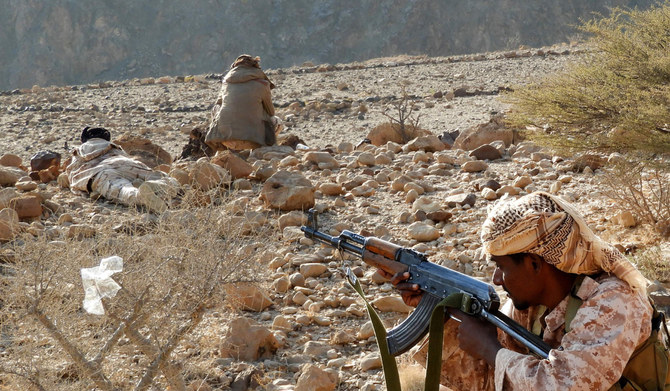
- AQAP is seen as one of the more dangerous branches of the terror group still operating more than a decade after the killing of founder Osama bin Laden
SANAA, Yemen: An explosive device detonated and killed six troops loyal to a United Arab Emirates-backed secessionist group Monday in southern Yemen, a military spokesman said, the latest attack blamed on Al-Qaeda militants in the impoverished Arab country.
The explosion hit a military vehicle as it passed in a mountainous area in the Modiyah district of southern Abyan province, said Mohamed Al-Naqib, a spokesman for the Southern Armed Forces, the military arm of the secessionist Southern Transitional Council.
Eleven other troops were wounded, he added.
It is at odds with the internationally recognized government, although they are allies in Yemen’s years long war against the Iranian-backed Houthi rebels who control the north and the capital Sanaa.
Al-Naqib blamed Al-Qaeda in the Arabian Peninsula, or AQAP, for the attack.
AQAP is seen as one of the more dangerous branches of the terror group still operating more than a decade after the killing of founder Osama bin Laden.
It is active in several regions in Yemen, exploiting the country’s civil war to cement its presence in the nation at the southern tip of the Arabian Peninsula.
Yemen’s ruinous civil war began in 2014 when the Houthis seized the capital of Sanaa and much of northern Yemen and forced the internationally recognized government into exile.
Saudi authorities issue severe weather warning

- Schools, universities in some regions switch to remote learning after storms, high winds forecast
RIYADH: Saudi authorities warned residents that most parts of the Kingdom will experience severe weather until Friday.
The National Center of Meteorology on Monday forecast moderate-to-heavy rain in the Madinah, Makkah, Jeddah, Baha and Najran regions, accompanied by high winds, hail and thunder.
Saudi Arabia’s General Directorate of Civil Defense also issued severe weather warnings accompanied by safety instructions as the country braces for heavy rainfall in coming days.
The Civil Defense said that most parts of the Kingdom will experience moderate-to-torrential thundershowers, accompanied by strong winds, until Friday.
Regions to be affected include Asir, Baha, Makkah, Madinah, Jazan, Qassim, Jouf, Hail, Tabuk, Northern Borders, Riyadh and the Eastern Province.
The General Directorate of Civil Defense has urged people to take precautions, remain indoors during stormy weather, and adhere to its instructions.
Schools in Jeddah, Makkah and Madinah regions switched to online classes through the Madrasati remote-learning platform on Monday after authorities warned of storms and possible floods this week.
The King Abdulaziz University in Jeddah, University of Jeddah, University of Taif, and Umm Al Qura University in Makkah were closed on Monday and postponed scheduled exams until further notice.
Taibah University in Madinah and Saudi Electronic University’s branch in Jeddah also suspended in-person classes on Monday, and switched to remote learning.
Jeddah Municipality implemented a field plan to deal with the weather conditions, and urged residents to show caution and stay away from flooded areas.
Bandar bin Saleh Al-Hadiya, director of the Ministry of Environment, Water and Agriculture branch in the Northern Border region, inspected dam safety in Arar ahead of the rainy situation.
Riyadh region was also hit by a heavy sandstorm accompanied by high winds on Sunday night, leaving the city skyline enveloped in dust.
On Monday, the NCM issued a red alert for dust storms in parts of the Riyadh region, including the capital, and Al-Aflaj, Al-Sulail and Wadi Al-Dawasir governorates.




